- Home
- Alexandre Dumas
Vingt ans après. English Page 3
Vingt ans après. English Read online
Page 3
3. Dead Animosities.
D'Artagnan arrived at the Bastile just as it was striking half-pasteight. His visit was announced to the governor, who, on hearing that hecame from the cardinal, went to meet him and received him at the top ofthe great flight of steps outside the door. The governor of the Bastilewas Monsieur du Tremblay, the brother of the famous Capuchin, Joseph,that fearful favorite of Richelieu's, who went by the name of the GrayCardinal.
During the period that the Duc de Bassompierre passed in theBastile--where he remained for twelve long years--when his companions,in their dreams of liberty, said to each other: "As for me, I shall goout of the prison at such a time," and another, at such and such a time,the duke used to answer, "As for me, gentlemen, I shall leave only whenMonsieur du Tremblay leaves;" meaning that at the death of the cardinalDu Tremblay would certainly lose his place at the Bastile and DeBassompierre regain his at court.
His prediction was nearly fulfilled, but in a very different way fromthat which De Bassompierre supposed; for after the death of Richelieueverything went on, contrary to expectation, in the same way as before;and Bassompierre had little chance of leaving his prison.
Monsieur du Tremblay received D'Artagnan with extreme politeness andinvited him to sit down with him to supper, of which he was himselfabout to partake.
"I should be delighted to do so," was the reply; "but if I am notmistaken, the words 'In haste,' are written on the envelope of theletter which I brought."
"You are right," said Du Tremblay. "Halloo, major! tell them to orderNumber 25 to come downstairs."
The unhappy wretch who entered the Bastile ceased, as he crossed thethreshold, to be a man--he became a number.
D'Artagnan shuddered at the noise of the keys; he remained on horseback,feeling no inclination to dismount, and sat looking at the bars, at thebuttressed windows and the immense walls he had hitherto only seen fromthe other side of the moat, but by which he had for twenty years beenawe-struck.
A bell resounded.
"I must leave you," said Du Tremblay; "I am sent for to sign the releaseof a prisoner. I shall be happy to meet you again, sir."
"May the devil annihilate me if I return thy wish!" murmured D'Artagnan,smiling as he pronounced the imprecation; "I declare I feel quite illafter only being five minutes in the courtyard. Go to! go to! I wouldrather die on straw than hoard up a thousand a year by being governor ofthe Bastile."
He had scarcely finished this soliloquy before the prisoner arrived. Onseeing him D'Artagnan could hardly suppress an exclamation of surprise.The prisoner got into the carriage without seeming to recognize themusketeer.
"Gentlemen," thus D'Artagnan addressed the four musketeers, "I amordered to exercise the greatest possible care in guarding the prisoner,and since there are no locks to the carriage, I shall sit beside him.Monsieur de Lillebonne, lead my horse by the bridle, if you please." Ashe spoke he dismounted, gave the bridle of his horse to the musketeerand placing himself by the side of the prisoner said, in a voiceperfectly composed, "To the Palais Royal, at full trot."
The carriage drove on and D'Artagnan, availing himself of the darknessin the archway under which they were passing, threw himself into thearms of the prisoner.
"Rochefort!" he exclaimed; "you! is it you, indeed? I am not mistaken?"
"D'Artagnan!" cried Rochefort.
"Ah! my poor friend!" resumed D'Artagnan, "not having seen you for fouror five years I concluded you were dead."
"I'faith," said Rochefort, "there's no great difference, I think,between a dead man and one who has been buried alive; now I have beenburied alive, or very nearly so."
"And for what crime are you imprisoned in the Bastile."
"Do you wish me to speak the truth?"
"Yes."
"Well, then, I don't know."
"Have you any suspicion of me, Rochefort?"
"No! on the honor of a gentleman; but I cannot be imprisoned for thereason alleged; it is impossible."
"What reason?" asked D'Artagnan.
"For stealing."
"For stealing! you, Rochefort! you are laughing at me."
"I understand. You mean that this demands explanation, do you not?"
"I admit it."
"Well, this is what actually took place: One evening after an orgy inReinard's apartment at the Tuileries with the Duc d'Harcourt,Fontrailles, De Rieux and others, the Duc d'Harcourt proposed that weshould go and pull cloaks on the Pont Neuf; that is, you know, adiversion which the Duc d'Orleans made quite the fashion."
"Were you crazy, Rochefort? at your age!"
"No, I was drunk. And yet, since the amusement seemed to me rather tame,I proposed to Chevalier de Rieux that we should be spectators instead ofactors, and, in order to see to advantage, that we should mount thebronze horse. No sooner said than done. Thanks to the spurs, whichserved as stirrups, in a moment we were perched upon the croupe; we werewell placed and saw everything. Four or five cloaks had already beenlifted, with a dexterity without parallel, and not one of the victimshad dared to say a word, when some fool of a fellow, less patient thanthe others, took it into his head to cry out, 'Guard!' and drew upon usa patrol of archers. Duc d'Harcourt, Fontrailles, and the othersescaped; De Rieux was inclined to do likewise, but I told him theywouldn't look for us where we were. He wouldn't listen, put his foot onthe spur to get down, the spur broke, he fell with a broken leg, and,instead of keeping quiet, took to crying out like a gallows-bird. I thenwas ready to dismount, but it was too late; I descended into the arms ofthe archers. They conducted me to the Chatelet, where I slept soundly,being very sure that on the next day I should go forth free. The nextday came and passed, the day after, a week; I then wrote to thecardinal. The same day they came for me and took me to the Bastile. Thatwas five years ago. Do you believe it was because I committed thesacrilege of mounting en croupe behind Henry IV.?"
"No; you are right, my dear Rochefort, it couldn't be for that; but youwill probably learn the reason soon."
"Ah, indeed! I forgot to ask you--where are you taking me?"
"To the cardinal."
"What does he want with me?"
"I do not know. I did not even know that you were the person I was sentto fetch."
"Impossible--you--a favorite of the minister!"
"A favorite! no, indeed!" cried D'Artagnan. "Ah, my poor friend! I amjust as poor a Gascon as when I saw you at Meung, twenty-two years ago,you know; alas!" and he concluded his speech with a deep sigh.
"Nevertheless, you come as one in authority."
"Because I happened to be in the ante-chamber when the cardinal calledme, by the merest chance. I am still a lieutenant in the musketeers andhave been so these twenty years."
"Then no misfortune has happened to you?"
"And what misfortune could happen to me? To quote some Latin verses Ihave forgotten, or rather, never knew well, 'the thunderbolt never fallson the valleys,' and I am a valley, dear Rochefort,--one of the lowliestof the low."
"Then Mazarin is still Mazarin?"
"The same as ever, my friend; it is said that he is married to thequeen."
"Married?"
"If not her husband, he is unquestionably her lover."
"You surprise me. Rebuff Buckingham and consent to Mazarin!"
"Just like the women," replied D'Artagnan, coolly.
"Like women, not like queens."
"Egad! queens are the weakest of their sex, when it comes to such thingsas these."
"And M. de Beaufort--is he still in prison?"
"Yes. Why?"
"Oh, nothing, but that he might get me out of this, if he were favorablyinclined to me."
"You are probably nearer freedom than he is, so it will be your businessto get him out."
"And," said the prisoner, "what talk is there of war with Spain?"
"With Spain, no," answered D'Artagnan; "but Paris."
"What do you mean?" cried Rochefort.
"Do you hear the guns, pray? The citizens are amusing them
selves in themeantime."
"And you--do you really think that anything could be done with thesebourgeois?"
"Yes, they might do well if they had any leader to unite them in onebody."
"How miserable not to be free!"
"Don't be downcast. Since Mazarin has sent for you, it is because hewants you. I congratulate you! Many a long year has passed since any onehas wanted to employ me; so you see in what a situation I am."
"Make your complaints known; that's my advice."
"Listen, Rochefort; let us make a compact. We are friends, are we not?"
"Egad! I bear the traces of our friendship--three slits or slashes fromyour sword."
"Well, if you should be restored to favor, don't forget me."
"On the honor of a Rochefort; but you must do the like for me."
"There's my hand,--I promise."
"Therefore, whenever you find any opportunity of saying something in mybehalf----"
"I shall say it, and you?"
"I shall do the same."
"Apropos, are we to speak of your friends also, Athos, Porthos, andAramis? or have you forgotten them?"
"Almost."
"What has become of them?"
"I don't know; we separated, as you know. They are alive, that's allthat I can say about them; from time to time I hear of them indirectly,but in what part of the world they are, devil take me if I know, No, onmy honor, I have not a friend in the world but you, Rochefort."
"And the illustrious--what's the name of the lad whom I made a sergeantin Piedmont's regiment?"
"Planchet!"
"The illustrious Planchet. What has become of him?"
"I shouldn't wonder if he were at the head of the mob at this verymoment. He married a woman who keeps a confectioner's shop in the Ruedes Lombards, for he's a lad who was always fond of sweetmeats; he's nowa citizen of Paris. You'll see that that queer fellow will be a sheriffbefore I shall be a captain."
"Come, dear D'Artagnan, look up a little! Courage! It is when one islowest on the wheel of fortune that the merry-go-round wheels andrewards us. This evening your destiny begins to change."
"Amen!" exclaimed D'Artagnan, stopping the carriage.
"What are you doing?" asked Rochefort.
"We are almost there and I want no one to see me getting out of yourcarriage; we are supposed not to know each other."
"You are right. Adieu."
"Au revoir. Remember your promise."
In five minutes the party entered the courtyard and D'Artagnan led theprisoner up the great staircase and across the corridor andante-chamber.
As they stopped at the door of the cardinal's study, D'Artagnan wasabout to be announced when Rochefort slapped him on his shoulder.
"D'Artagnan, let me confess to you what I've been thinking about duringthe whole of my drive, as I looked out upon the parties of citizens whoperpetually crossed our path and looked at you and your four men withfiery eyes."
"Speak out," answered D'Artagnan.
"I had only to cry out 'Help!' for you and for your companions to be cutto pieces, and then I should have been free."
"Why didn't you do it?" asked the lieutenant.
"Come, come!" cried Rochefort. "Did we not swear friendship? Ah! had anyone but you been there, I don't say----"
D'Artagnan bowed. "Is it possible that Rochefort has become a better manthan I am?" he said to himself. And he caused himself to be announced tothe minister.
"Let M. de Rochefort enter," said Mazarin, eagerly, on hearing theirnames pronounced; "and beg M. d'Artagnan to wait; I shall have furtherneed of him."
These words gave great joy to D'Artagnan. As he had said, it had been along time since any one had needed him; and that demand for his serviceson the part of Mazarin seemed to him an auspicious sign.
Rochefort, rendered suspicious and cautious by these words, entered theapartment, where he found Mazarin sitting at the table, dressed in hisordinary garb and as one of the prelates of the Church, his costumebeing similar to that of the abbes in that day, excepting that his scarfand stockings were violet.
As the door was closed Rochefort cast a glance toward Mazarin, which wasanswered by one, equally furtive, from the minister.
There was little change in the cardinal; still dressed with sedulouscare, his hair well arranged and curled, his person perfumed, he looked,owing to his extreme taste in dress, only half his age. But Rochefort,who had passed five years in prison, had become old in the lapse of afew years; the dark locks of this estimable friend of the defunctCardinal Richelieu were now white; the deep bronze of his complexion hadbeen succeeded by a mortal pallor which betokened debility. As he gazedat him Mazarin shook his head slightly, as much as to say, "This is aman who does not appear to me fit for much."
After a pause, which appeared an age to Rochefort, Mazarin took from abundle of papers a letter, and showing it to the count, he said:
"I find here a letter in which you sue for liberty, Monsieur deRochefort. You are in prison, then?"
Rochefort trembled in every limb at this question. "But I thought," hesaid, "that your eminence knew that circumstance better than anyone----"
"I? Oh no! There is a congestion of prisoners in the Bastile, who werecooped up in the time of Monsieur de Richelieu; I don't even know theirnames."
"Yes, but in regard to myself, my lord, it cannot be so, for I wasremoved from the Chatelet to the Bastile owing to an order from youreminence."
"You think you were."
"I am certain of it."
"Ah, stay! I fancy I remember it. Did you not once refuse to undertake ajourney to Brussels for the queen?"
"Ah! ah!" exclaimed Rochefort. "There is the true reason! Idiot that Iam, though I have been trying to find it out for five years, I neverfound it out."
"But I do not say it was the cause of your imprisonment. I merely askyou, did you not refuse to go to Brussels for the queen, whilst you hadconsented to go there to do some service for the late cardinal?"
"That is the very reason I refused to go back to Brussels. I was thereat a fearful moment. I was sent there to intercept a correspondencebetween Chalais and the archduke, and even then, when I was discovered Iwas nearly torn to pieces. How could I, then, return to Brussels? Ishould injure the queen instead of serving her."
"Well, since the best motives are liable to misconstruction, the queensaw in your refusal nothing but a refusal--a distinct refusal she hadalso much to complain of you during the lifetime of the late cardinal;yes, her majesty the queen----"
Rochefort smiled contemptuously.
"Since I was a faithful servant, my lord, to Cardinal Richelieu duringhis life, it stands to reason that now, after his death, I should serveyou well, in defiance of the whole world."
"With regard to myself, Monsieur de Rochefort," replied Mazarin, "I amnot, like Monsieur de Richelieu, all-powerful. I am but a minister, whowants no servants, being myself nothing but a servant of the queen's.Now, the queen is of a sensitive nature. Hearing of your refusal to obeyher she looked upon it as a declaration of war, and as she considers youa man of superior talent, and consequently dangerous, she desired me tomake sure of you; that is the reason of your being shut up in theBastile. But your release can be managed. You are one of those men whocan comprehend certain matters and having understood them, can act withenergy----"
"Such was Cardinal Richelieu's opinion, my lord."
"The cardinal," interrupted Mazarin, "was a great politician and thereinshone his vast superiority over me. I am a straightforward, simple man;that's my great disadvantage. I am of a frankness of character quiteFrench."
Rochefort bit his lips in order to prevent a smile.
"Now to the point. I want friends; I want faithful servants. When I sayI want, I mean the queen wants them. I do nothing without hercommands--pray understand that; not like Monsieur de Richelieu, who wenton just as he pleased. So I shall never be a great man, as he was, butto compensate for that, I shall be a good man, Monsieur de Rochefort,a
nd I hope to prove it to you."
Rochefort knew well the tones of that soft voice, in which soundedsometimes a sort of gentle lisp, like the hissing of young vipers.
"I am disposed to believe your eminence," he replied; "though I have hadbut little evidence of that good-nature of which your eminence speaks.Do not forget that I have been five years in the Bastile and that nomedium of viewing things is so deceptive as the grating of a prison."
"Ah, Monsieur de Rochefort! have I not told you already that I hadnothing to do with that? The queen--cannot you make allowances for thepettishness of a queen and a princess? But that has passed away assuddenly as it came, and is forgotten."
"I can easily suppose, sir, that her majesty has forgotten it amid thefetes and the courtiers of the Palais Royal, but I who have passed thoseyears in the Bastile----"
"Ah! mon Dieu! my dear Monsieur de Rochefort! do you absolutely thinkthat the Palais Royal is the abode of gayety? No. We have had greatannoyances there. As for me, I play my game squarely, fairly, and aboveboard, as I always do. Let us come to some conclusion. Are you one ofus, Monsieur de Rochefort?"
"I am very desirous of being so, my lord, but I am totally in the darkabout everything. In the Bastile one talks politics only with soldiersand jailers, and you have not an idea, my lord, how little is known ofwhat is going on by people of that sort; I am of Monsieur deBassompierre's party. Is he still one of the seventeen peers of France?"
"He is dead, sir; a great loss. His devotion to the queen was boundless;men of loyalty are scarce."
"I think so, forsooth," said Rochefort, "and when you find any of them,you march them off to the Bastile. However, there are plenty in theworld, but you don't look in the right direction for them, my lord."
"Indeed! explain to me. Ah! my dear Monsieur de Rochefort, how much youmust have learned during your intimacy with the late cardinal! Ah! hewas a great man."
"Will your eminence be angry if I read you a lesson?"
"I! never! you know you may say anything to me. I try to be beloved, notfeared."
"Well, there is on the wall of my cell, scratched with a nail, aproverb, which says, 'Like master, like servant.'"
"Pray, what does that mean?"
"It means that Monsieur de Richelieu was able to find trusty servants,dozens and dozens of them."
"He! the point aimed at by every poniard! Richelieu, who passed his lifein warding off blows which were forever aimed at him!"
"But he did ward them off," said De Rochefort, "and the reason was, thatthough he had bitter enemies he possessed also true friends. I haveknown persons," he continued--for he thought he might avail himself ofthe opportunity of speaking of D'Artagnan--"who by their sagacity andaddress have deceived the penetration of Cardinal Richelieu; who bytheir valor have got the better of his guards and spies; persons withoutmoney, without support, without credit, yet who have preserved to thecrowned head its crown and made the cardinal crave pardon."
"But those men you speak of," said Mazarin, smiling inwardly on seeingRochefort approach the point to which he was leading him, "those menwere not devoted to the cardinal, for they contended against him."
"No; in that case they would have met with more fitting reward. They hadthe misfortune to be devoted to that very queen for whom just now youwere seeking servants."
"But how is it that you know so much of these matters?"
"I know them because the men of whom I speak were at that time myenemies; because they fought against me; because I did them all the harmI could and they returned it to the best of their ability; because oneof them, with whom I had most to do, gave me a pretty sword-thrust, nowabout seven years ago, the third that I received from the same hand; itclosed an old account."
"Ah!" said Mazarin, with admirable suavity, "could I but find such men!"
"My lord, there has stood for six years at your very door a man such asI describe, and during those six years he has been unappreciated andunemployed by you."
"Who is it?"
"It is Monsieur d'Artagnan."
"That Gascon!" cried Mazarin, with well acted surprise.
"'That Gascon' has saved a queen and made Monsieur de Richelieu confessthat in point of talent, address and political skill, to him he was onlya tyro."
"Really?"
"It is as I have the honor of telling it to your excellency."
"Tell me a little about it, my dear Monsieur de Rochefort."
"That is somewhat difficult, my lord," said Rochefort, with a smile.
"Then he will tell it me himself."
"I doubt it, my lord."
"Why do you doubt it?"
"Because the secret does not belong to him; because, as I have told you,it has to do with a great queen."
"And he was alone in achieving an enterprise like that?"
"No, my lord, he had three colleagues, three brave men, men such as youwere wishing for just now."
"And were these four men attached to each other, true in heart, reallyunited?"
"As if they had been one man--as if their four hearts had pulsated inone breast."
"You pique my curiosity, dear Rochefort; pray tell me the whole story."
"That is impossible; but I will tell you a true story, my lord."
"Pray do so, I delight in stories," cried the cardinal.
"Listen, then," returned Rochefort, as he spoke endeavoring to read inthat subtle countenance the cardinal's motive. "Once upon a time therelived a queen--a powerful monarch--who reigned over one of the greatestkingdoms of the universe; and a minister; and this minister wished muchto injure the queen, whom once he had loved too well. (Do not try, mylord, you cannot guess who it is; all this happened long before you cameinto the country where this queen reigned.) There came to the court anambassador so brave, so magnificent, so elegant, that every woman losther heart to him; and the queen had even the indiscretion to give himcertain ornaments so rare that they could never be replaced by any likethem.
"As these ornaments were given by the king the minister persuaded hismajesty to insist upon the queen's appearing in them as part of herjewels at a ball which was soon to take place. There is no occasion totell you, my lord, that the minister knew for a fact that theseornaments had sailed away with the ambassador, who was far away, beyondseas. This illustrious queen had fallen low as the least of hersubjects--fallen from her high estate."
"Indeed!"
"Well, my lord, four men resolved to save her. These four men were notprinces, neither were they dukes, neither were they men in power; theywere not even rich. They were four honest soldiers, each with a goodheart, a good arm and a sword at the service of those who wanted it.They set out. The minister knew of their departure and had plantedpeople on the road to prevent them ever reaching their destination.Three of them were overwhelmed and disabled by numerous assailants; oneof them alone arrived at the port, having either killed or wounded thosewho wished to stop him. He crossed the sea and brought back the set ofornaments to the great queen, who was able to wear them on her shoulderon the appointed day; and this very nearly ruined the minister. What doyou think of that exploit, my lord?"
"It is magnificent!" said Mazarin, thoughtfully.
"Well, I know of ten such men."
Mazarin made no reply; he reflected.
Five or six minutes elapsed.
"You have nothing more to ask of me, my lord?" said Rochefort.
"Yes. And you say that Monsieur d'Artagnan was one of those four men?"
"He led the enterprise."
"And who were the others?"
"I leave it to Monsieur d'Artagnan to name them, my lord. They were hisfriends and not mine. He alone would have any influence with them; I donot even know them under their true names."
"You suspect me, Monsieur de Rochefort; I want him and you and all toaid me."
"Begin with me, my lord; for after five or six years of imprisonment itis natural to feel some curiosity as to one's destination."
"You, my dear Monsieur de Roche
fort, shall have the post of confidence;you shall go to Vincennes, where Monsieur de Beaufort is confined; youwill guard him well for me. Well, what is the matter?"
"The matter is that you have proposed to me what is impossible," saidRochefort, shaking his head with an air of disappointment.
"What! impossible? And why is it impossible?"
"Because Monsieur de Beaufort is one of my friends, or rather, I am oneof his. Have you forgotten, my lord, that it is he who answered for meto the queen?"
"Since then Monsieur de Beaufort has become an enemy of the State."
"That may be, my lord; but since I am neither king nor queen norminister, he is not my enemy and I cannot accept your offer."
"This, then, is what you call devotion! I congratulate you. Yourdevotion does not commit you too far, Monsieur de Rochefort."
"And then, my lord," continued Rochefort, "you understand that to emergefrom the Bastile in order to enter Vincennes is only to change one'sprison."
"Say at once that you are on the side of Monsieur de Beaufort; that willbe the most sincere line of conduct," said Mazarin.
"My lord, I have been so long shut up, that I am only of one party--I amfor fresh air. Employ me in any other way; employ me even actively, butlet it be on the high roads."
"My dear Monsieur de Rochefort," Mazarin replied in a tone of raillery,"you think yourself still a young man; your spirit is that of thephoenix, but your strength fails you. Believe me, you ought now to takea rest. Here!"
"You decide, then, nothing about me, my lord?"
"On the contrary, I have come to a decision."
Bernouin came into the room.
"Call an officer of justice," he said; "and stay close to me," he added,in a low tone.
The officer entered. Mazarin wrote a few words, which he gave to thisman; then he bowed.
"Adieu, Monsieur de Rochefort," he said.
Rochefort bent low.
"I see, my lord, I am to be taken back to the Bastile."
"You are sagacious."
"I shall return thither, my lord, but it is a mistake on your part notto employ me."
"You? the friend of my greatest foes? Don't suppose that you are theonly person who can serve me, Monsieur de Rochefort. I shall find manymen as able as you are."
"I wish you may, my lord," replied De Rochefort.
He was then reconducted by the little staircase, instead of passingthrough the ante-chamber where D'Artagnan was waiting. In the courtyardthe carriage and the four musketeers were ready, but he looked around invain for his friend.
"Ah!" he muttered to himself, "this changes the situation, and if thereis still a crowd of people in the streets we will try to show Mazarinthat we are still, thank God, good for something else than keeping guardover a prisoner;" and he jumped into the carriage with the alacrity of aman of five-and-twenty.

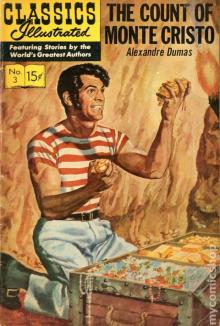 The Count of Monte Cristo, Illustrated
The Count of Monte Cristo, Illustrated Knight of Maison-Rouge
Knight of Maison-Rouge![The Three Musketeers - Alexandre Dumas - [Full Version] - (ANNOTATED) Read online](http://i1.bookreadfree.com/14/the_three_musketeers_-_alexandre_dumas_-_[full_version]_-_annotated_preview.jpg) The Three Musketeers - Alexandre Dumas - [Full Version] - (ANNOTATED)
The Three Musketeers - Alexandre Dumas - [Full Version] - (ANNOTATED)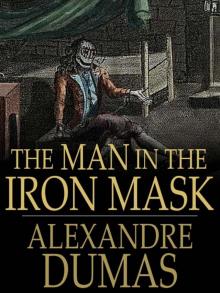 The Man in the Iron Mask
The Man in the Iron Mask The Count of Monte Cristo (Penguin Classics eBook)
The Count of Monte Cristo (Penguin Classics eBook) Count of Monte Cristo (abridged) (Barnes & Noble Classics Series)
Count of Monte Cristo (abridged) (Barnes & Noble Classics Series) The Women's War
The Women's War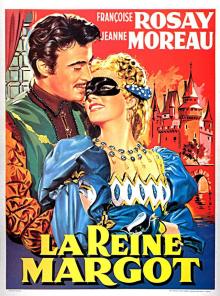 La reine Margot. English
La reine Margot. English The Vicomte de Bragelonne
The Vicomte de Bragelonne__english_preview.jpg) La dame aux camélias (Novel). English
La dame aux camélias (Novel). English The Count of Monte Cristo
The Count of Monte Cristo Balsamo, the Magician; or, The Memoirs of a Physician
Balsamo, the Magician; or, The Memoirs of a Physician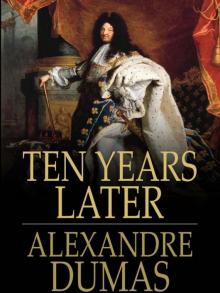 Ten Years Later
Ten Years Later The Romance of Violette
The Romance of Violette The Mesmerist's Victim
The Mesmerist's Victim Vingt ans après. English
Vingt ans après. English Le collier de la reine. English
Le collier de la reine. English Taking the Bastile; Or, Pitou the Peasant
Taking the Bastile; Or, Pitou the Peasant The Hero of the People: A Historical Romance of Love, Liberty and Loyalty
The Hero of the People: A Historical Romance of Love, Liberty and Loyalty Louise de la Valliere
Louise de la Valliere Les Quarante-cinq. English
Les Quarante-cinq. English Ange Pitou (Volume 1)
Ange Pitou (Volume 1) The Royal Life Guard; or, the flight of the royal family.
The Royal Life Guard; or, the flight of the royal family. Les trois mousquetaires. English
Les trois mousquetaires. English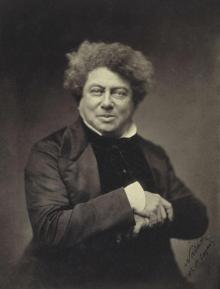 Une fille du régent. English
Une fille du régent. English The Knight of Maison-Rouge
The Knight of Maison-Rouge The Count of Monte Cristo (Unabridged Penguin)
The Count of Monte Cristo (Unabridged Penguin) Ange Pitou
Ange Pitou The Romance of Violette (vintage erotica)
The Romance of Violette (vintage erotica) The Three Musketeers
The Three Musketeers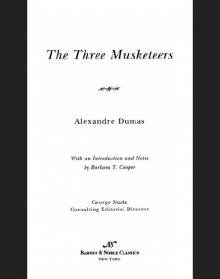 Three Musketeers (Barnes & Noble Classics Series)
Three Musketeers (Barnes & Noble Classics Series) Georges
Georges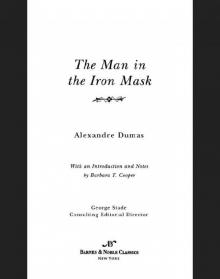 Man in the Iron Mask (Barnes & Noble Classics Series)
Man in the Iron Mask (Barnes & Noble Classics Series) The Red Sphinx
The Red Sphinx